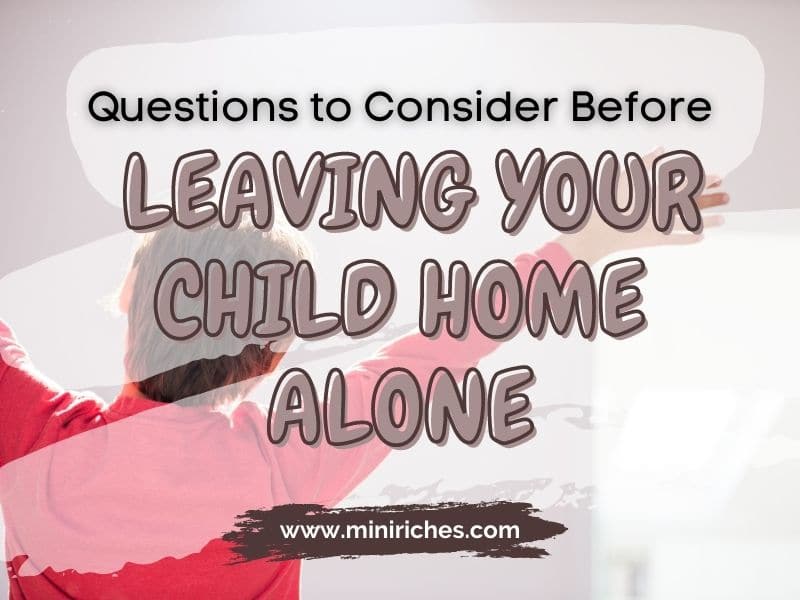
Leaving Your Child Home Alone: Questions to Consider
The day you realize leaving your child home alone might be an option for you can be a day of mixed feelings. Part of you is rejoicing in the newfound freedom you have to run to the grocery store without someone begging for a random cheap toy hanging on an aisle end cap. The other part of you worries that your child is not responsible or old enough and will burn the house down or stumble upon a sketchy website.
Deciding if leaving your child home alone is the right decision for your family isn’t a one-size-fits-all situation. There are plenty of variants to consider. We’ve compiled a list of questions to ask yourself before leaving your child home alone.
Questions to consider before leaving your child home alone:

1. What is the legal age to leave your child home alone?
Only a handful of states have an established legal age when it comes to leaving your child home alone unsupervised. Maryland requires children to be 8 years old, Oregon requires children to be 10 years old, and Illinois requires children to be 14 years old. Most other states have recommended ages and guidelines to see if your child is ready—physically and mentally—to stay home alone.
If something happens while your child is home alone, and the law deems that they were unfit to be left alone, you could be charged with child neglect and endangerment. A great resource to help you determine if leaving your child home alone is an option for you and qualifies under state guidelines is the child welfare website. Here you can find your state’s information for their local child welfare websites, which usually contains your state’s guidelines for leaving a child home alone.
I checked out some of the links. Once they brought me to the home page, I was able to search “when to leave a child home alone,” and their recommendations popped right up. Some states need to get it together because nothing pulled up when I did the same search. You could also do a quick search on your web browser of choice for “when can I leave my child home alone in insert your state.” I found that to be quite effective as well.
2. Would staying home alone be scary for your child?
You can be too old for a lot of things, but you’re never too old to be afraid.
— Home Alone
Leaving your child home alone may be scary for you, but it could also be scary for your child. From our experience, children 10 and under have a bigger fear of being alone than children that are 11 and older. Older children strive for independence, while younger children still rely on their parents for safety and security. Some younger children may act big and tough, like staying home alone won’t be scary, but if your youngster needs a nightlight or for you to check under their bed at bedtime, I’d wager they aren’t ready to stay home alone.
Findlaw.com has some age and duration of alone time recommendations that I found helpful when considering leaving your child home alone. I tweaked their recommendations just a little and elaborated a bit to give you a better understanding of what we believe is age-appropriate.
- 7-year-olds and younger should not be left alone for any period of time.
- 8 to 10-year-olds may be left alone for up to 60 minutes—depending on the safety of the neighborhood and their maturity level—but only during daylight and early evening hours.
- 11 and 12-year-olds may be left alone for up to 3 hours, but not at night or in circumstances requiring inappropriate responsibility. Inappropriate responsibility may include expecting them to do tasks that could put them or others at risk or in danger, like mowing the lawn, elaborate cooking, or watching little ones while swimming.
- 13 to 15-year-olds may be left home alone unsupervised but should not be left alone overnight.
- 16 to 18-year-olds may be left alone unsupervised, possibly for two consecutive nights depending on the circumstances and other factors of what that responsibility would entail.
3. Does your child show personal responsibility without being told to do so?
This is a big one when considering leaving your child home alone or not. Every kid has their bouts of not listening, especially if they’d rather be doing something more fun. When it comes to the important stuff, like locking or answering the door, turning off the stovetop, or being trusted with internet access, can you undoubtedly say that your child will make the right decision? If the answer is yes, then leaving your child home alone could very well be an option. If the answer is no, then leaving your child home alone may not be in your —or their—best interest.
4. Will your child be watching younger siblings?

It still counts as leaving your child home alone, even if they are babysitting a younger sibling or two. However, the responsibilities just got bigger. Being responsible for others is a great learning experience. If your child can’t change their sibling’s diaper, feed them a bottle, or help a toddler use the toilet, you may want to reconsider leaving your child home alone to babysit for more than 20 minutes.
If their younger siblings are more self-sufficient, do you believe they will also follow the rules even when given by their older sibling? Will they cause problems if left under the supervision of their oldest sibling? You may want to rethink leaving your child home alone if doing so will result in a lot of fighting and arguing between siblings.
5. Is your neighborhood safe?
Not all neighborhoods are safe, and safety should be number one when leaving your child home alone. I don’t trust many people much farther than I can throw them, and we live in what I would consider a safe neighborhood. I know I can trust my neighbors and even the strangers who live here that I don’t know personally, but that doesn’t mean that I automatically let my guard down.
If you don’t know your neighbors or know there is a high crime rate in your surrounding community, it would be best to for-go leaving your child at home alone unless it is entirely unavoidable.
6. How does your child respond to emergencies?
Consider instances when your child was hurt or found themself not knowing the next right thing to do. Does your child yell for an adult or try to problem solve on their own before asking an adult for help? Using critical thinking skills, especially under pressure, is a valuable skill to have, but not all kids develop those skills at the same age.
7. Do you have safety measures in place that your child knows how to use?

The days of a landline are quickly disappearing, but not all children have their own cell phone. Does your child have a way to call you or 911 in case of an emergency—such as a tablet with calling capabilities or a similar device? Does your child know when it is appropriate to call 911? Does he or she have your address memorized to be able to tell the dispatcher? Do they have your phone number and fire escape plan memorized?
Can they locate—and know how to use—the first aid kit if necessary?
You need to be sure when leaving your child home alone that your child is equipped and able to handle an emergency should one arise while you are away.
8. Are YOU ready to leave your child home alone?
It’s good to test the waters. If you believe your child is ready for such a big responsibility, but you aren’t quite ready to give them such a grown-up task, then start small. Try leaving your child alone for 30 minutes, tasked with a simple chore to complete before you get back. You can make a quick trip to the gas station or go on a 20-minute walk. Increase the home alone time as you feel comfortable. Soon, leaving your child home alone won’t be as stressful as it once was. You’ll be able to leave your mature, responsible child home alone long enough for you to have a few hours to enjoy outside of the home!
Trust your gut and keep an eye out for red flags.

I can tell you that none of these questions crossed my mind when I held our firstborn in my arms for the first time. A lot of questions didn’t cross our minds at that time, other than when we would see the next full night of sleep. The day has come to answer new questions, although we still haven’t quite figured out when we will get a full night’s sleep.
As parents, we are always hopeful for the best. It’s still important to watch out for the red flags that tell us our kids aren’t ready for certain situations. We hope you can answer these questions with confidence and make a sound decision on whether or not leaving your child home alone is right for you and your kids.
Are there any safety measures or testing you put your kids through before giving them the freedom of staying home alone? Let us know in the comments below! We love helping you out with our parenting wisdom, but we also love learning new parenting pearls of wisdom to apply to our own family!
